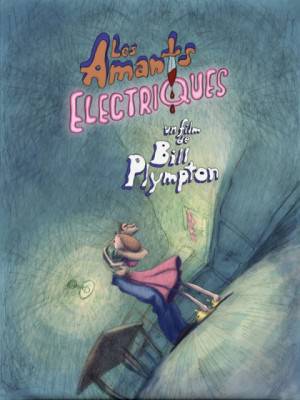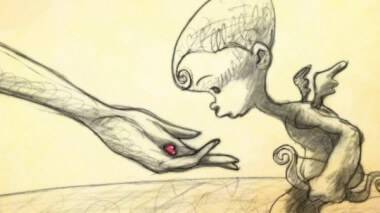Bill Plympton’s CHEATIN’ – Review
 A true festival highlight for this year’s Annecy-goers was the opportunity to see Bill Plympton‘s much-anticipated feature film Cheatin’ (or, in France, Les Amants Electriques) on the big screen. The film is his sixth independently-produced, full-lenth movie of the last twenty-odd years, an already impressive output before considering the forty-plus short films, commercial work and bibliography he has also racked up in that time. On top of all this he frequently travels with his films, and was in attendance at the festival to present it personally alongside producer Desirée Stavracos. For those who’ve followed the film’s production over the last few years – we at Skwigly certainly have – it’s clearly been a labour of love and a fine demonstration of commitment to one’s art. Documented by a series of production videos and bolstered in its latter stages of production by crowdfunding (which allowed for each pencil-rendered frame to be coloured with a rich, digital ‘watercolour’ look), anticipation has been high, and the film certainly delivers. While the film is many things – a romance, a dark comedy, a cautionary tale – above all else it’s essential viewing for anyone who truly appreciates the craft of animation itself, and how vividly and dynamically the most ambitious of ideas can be communicated through one man and his pencil.
A true festival highlight for this year’s Annecy-goers was the opportunity to see Bill Plympton‘s much-anticipated feature film Cheatin’ (or, in France, Les Amants Electriques) on the big screen. The film is his sixth independently-produced, full-lenth movie of the last twenty-odd years, an already impressive output before considering the forty-plus short films, commercial work and bibliography he has also racked up in that time. On top of all this he frequently travels with his films, and was in attendance at the festival to present it personally alongside producer Desirée Stavracos. For those who’ve followed the film’s production over the last few years – we at Skwigly certainly have – it’s clearly been a labour of love and a fine demonstration of commitment to one’s art. Documented by a series of production videos and bolstered in its latter stages of production by crowdfunding (which allowed for each pencil-rendered frame to be coloured with a rich, digital ‘watercolour’ look), anticipation has been high, and the film certainly delivers. While the film is many things – a romance, a dark comedy, a cautionary tale – above all else it’s essential viewing for anyone who truly appreciates the craft of animation itself, and how vividly and dynamically the most ambitious of ideas can be communicated through one man and his pencil.
An important development in Plympton’s feature work since Hair High – a story whose dialogue shone in graphic novel form but was unfortunately let down in the film itself by some of the lacklustre voice acting, an issue explored in his book Make Toons That Sell (Without Selling Out) – is the focus on visual storytelling. The absence of dialogue which began in his first ‘silent’ film Idiots & Angels not only eliminates the potential money-pit of casting, hiring and recording performers, but significantly adds to the atmosphere and lets the visual gags breathe.
The resulting tone of Cheatin’ is one semi-reminiscent of the work of Jean-Pierre Jeunet, Sylvain Chomet and their predecessors in European cinema, peppered with moments of distinctly American humour which recall not only Plympton’s own back catalogue (a certain dog may make an appearance or two) but also the gleeful abandon of Termite Terrace’s loosest slapstick.
The story itself is a solid, dark comedy-of-errors wherein the motives and actions of the characters are questionable and oftentimes illogical – but such is the effect of love, which is the predominant theme: in many respects this is a film about the extraordinarily dumb things we bags of flesh do in its name. Beginning at a fairground we meet Ella, a young woman seemingly closed off to the possibilities of love, turned around when her life is saved by Jake, a stolid adonis who works as a gas station attendant, constantly fending off the advances of other women. As newlyweds, theirs is the kind of blissful relationship designed to aggravate all those around them.
Envious interlopers make determined attempts to break up the couple, one particularly persistent would-be seductress who fancies a crack at Jake achieving success by staging a photograph of Ella in a seemingly compromising position. Distraught when presented with the image (the repeatedly failed suicides which ensue will go down in the annals of Plympton’s finest moments), Jake embarks on an illogical coping strategy of bedding every woman who throws herself at him. As the idyllic existence of the couple begins to unravel, the seemingly conventional and old-fashioned story tropes give way to a more surreal and fantastical series of events more familiarly ‘Plympton’ in nature. Reciprocated revenge plots spiral out of control until the film suddenly and unexpectedly delves into sci-fi with a metaphysically and psychologically complex denouement. The lighter moments (of which a vengeful Chief of Police determined to thwart the film’s resolution takes the top spot) remain in play enough to keep the final act from becoming too convoluted, though there is a strong emotional foothold throughout which keeps the audience invested in the fate of the characters.
While the overall distribution plan for the film is somewhat up in the air, it’s sure to continue to be a major hit on the festival circuit and definitely worth the trek if the chance to see it in a cinema pops up. Kudos, Mr. Plympton.
Watch Bill Plympton and get a glimpse of Cheatin’ in our latest episode of Lightbox!
For more on the film and Plympton’s recent work, check out our two-part interview as part of the Skwigly Animation Podcast episodes 9 and 10
You can also visit plymptoons.com, cheatinmovie.com and follow Bill on Twitter: @Plymptoons


